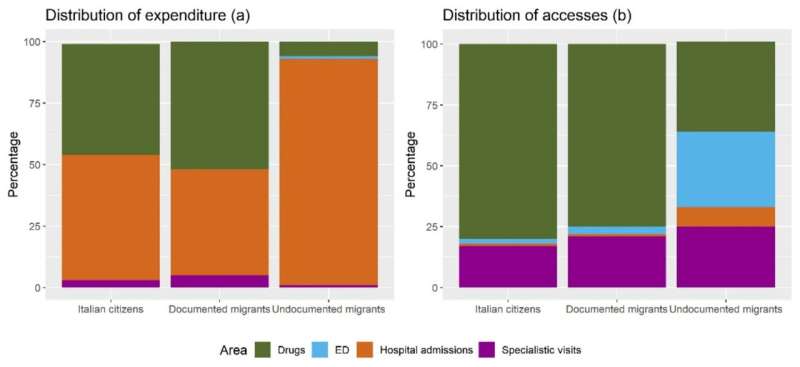This article has been reviewed according to Science X's editorial process and policies. Editors have highlighted the following attributes while ensuring the content's credibility:
fact-checked
peer-reviewed publication
proofread
Studies investigate health care for undocumented migrants

Undocumented migrants in Italy make more use of emergency rooms and hospital admissions than pharmaceutical prescriptions and specialist visits. This is true even for chronic diseases for which undocumented migrants are entitled to essential treatment beyond emergency: hospitalizations account for about 50% of total expenditure for Italian citizens affected by diabetes, but as much as 90% for undocumented migrants.
Furthermore, services provided to them by charities seem to be more effective than services provided by the Italian National Health System to documented migrants. In the case of diabetes again, receiving health care services from a charitable organization rather than from the NHS increases the probability of complying with prescriptions by 1.19 times.
These observations are among the first outputs of Motive, a project financed by the Italian ministry of Education and Research, which seeks to build a research platform containing a wealth of multiple-source health care data about migrants and frail populations. The aim is to promote its use to generate evidence for an efficient and effective decision-making process.
Modern technologies allow collection from various sources of an unprecedentedly vast amount of health-relevant information, generally referred to as "real-world data." Specifically, local and regional health care databases, that collect data for health care delivery system management, are very valuable resources for health care research. This is precisely the sort of information used in the project.
The project team includes representatives of various Italian universities, among which CERGAS Bocconi's Elisabetta Listorti and Aleksandra Torbica. As a result of the project, the two scholars, along with Silvano G. Cella, Gianfrancesco Fiorini, Giovanni Corrao and Matteo Franchi from University of Milan,University of Milan-Bicocca and Istituti Clinici Zucchi, have authored two papers about undocumented migrants affected by diabetes.
The first paper maps the types of diabetes care services used in Lombardy, quantifies the impact of preventable hospital admissions and examines the health care patterns linking pharmaceutical prescriptions with hospital accesses for three different categories of patients: Italian citizens, documented migrants and undocumented migrants. For short-term complications of diabetes, the authors find, preventable hospitalizations for undocumented migrants are four times higher than for Italian citizens.
The second paper shows that charities seem to provide services more sensitive to cultural specificities, leading to higher therapeutic compliance. This result highlights the need for better coordination by the authorities.
"The large gap between entitlements and actual use of health care services echoes the WHO call for improving health for all and reducing inequalities by addressing the challenges faced by migrants," Aleksandra Torbica explains. "As a starting point, we need to reflect on the barriers encountered by migrants in accessing all the health care services and the actions undertaken to overcome them."
"The essential role of charities has beneficial effects, such as a higher use of health care services by migrants thanks to the implementation of a series of migrant-oriented practices. However, the absence of integration between the NHS and these organizations makes it impossible to draw a complete picture of the use of health care services by undocumented migrants, leaving several questions open about their unmet health needs," Elisabetta Listorti says.
More information: Elisabetta Listorti et al, Healthcare Services for Undocumented Migrants: Organisation and Costs from the Italian NHS Perspective, International Journal of Environmental Research and Public Health (2022). DOI: 10.3390/ijerph192416447
Elisabetta Listorti et al, A Cohort Study on Diabetic Undocumented Migrants in Italy: Can Charitable Organizations Contribute to Higher Adherence?, International Journal of Environmental Research and Public Health (2023). DOI: 10.3390/ijerph20042794



















